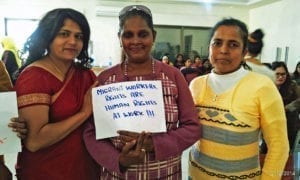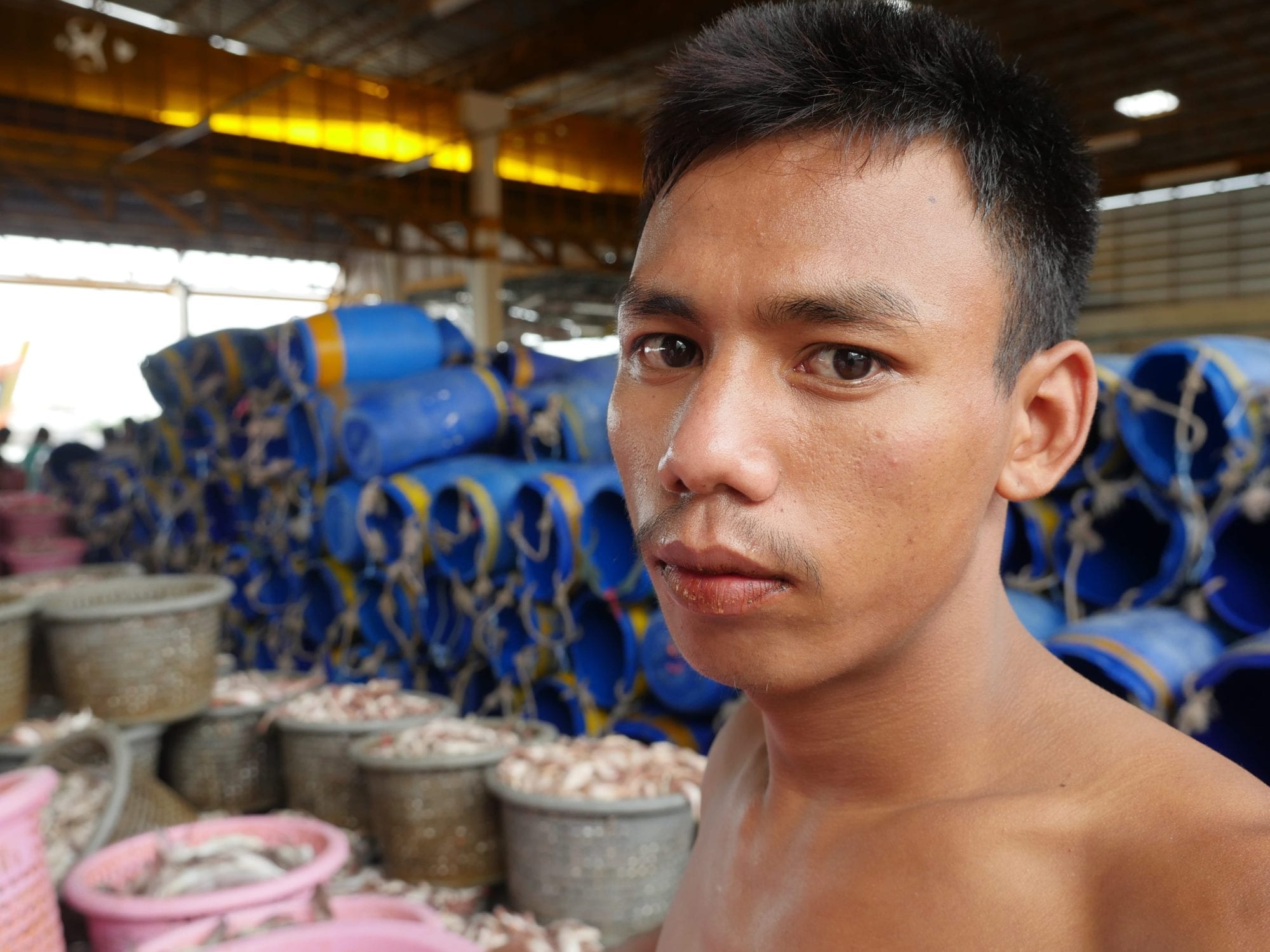The toxic spread of xenophobia, racism, misogyny and fear marginalizes millions of migrant workers and refugees—further disenfranchising people whose jobs do not lift them from poverty, afford them safe workplaces or uphold their dignity. The Solidarity Center is fighting this ugly trend through programs that recognize the human rights of workers, support their dreams of a better life and ensure their safety on the road and at their destination.
In 2015, more than 240 million people were international migrants, most having bravely risked the unknown for an opportunity at a better future or to escape violence, repression and injustice at home. This mass movement of people is the backbone of wealth created in the global economy, and it has the potential to be a positive force in the fight against poverty and inequality.
Labor migration—which accounts for 150 million international migrants—generates billions of dollars in economic activity every year. For individuals, a job in another country, under the right circumstances, can provide a life- and family-sustaining career. Hundreds of thousands of African workers who cross borders on the continent, for example, moving means finding paid work where none exists at home. Meanwhile, another 65 million people globally have fled tragedy, persecution and war, uprooting their families to seek what most people want: a stable, safe life.
Despite their varied motivations for leaving, these women and men have one thing in common: They all deserve respect, decent work and dignity.

Domestic workers in Jordan formed a worker rights network that includes migrant workers from Bangladesh, Indonesia, the Philippines and Sri Lanka. Credit: Solidarity Center/Francesca Ricciardone
The Solidarity Center works around the world to ensure that the rights of migrant workers and refugees of any category are respected, and partners with unions and worker-rights organizations to extend workplace protections to all workers. Together, we focus on creating safe migration processes for workers, including greater regulation of labor recruiters and the elimination of recruitment fees to prevent debt bondage. We also support the creation of networks among partners in origin and destination countries to ensure that migrant workers are protected along their journey. In 2016, we had migrant rights-supporting programs in 21 countries, reaching more than 15,000 workers.
The Solidarity Center also engages with partners to defend against xenophobia, racism and discrimination toward migrant workers, advocating for equal treatment and full rights for all workers. In addition, the Solidarity Center is exploring how unions and labor-support organizations may help promote integration of refugees and displaced persons into labor markets, breaking down the artificial categories used to divide workers, degrade working conditions and lower wages.
For example:
In Mexico, the Solidarity Center and its partners organize migrant workers, in their communities and prior to departure, helping them know and defend their rights, and resist rampant exploitation in the labor recruitment system.

Haitian workers in the Dominican Republic have few rights on the job. Credit: Solidarity Center/Ricardo Rojas
The Solidarity Center has partnered with unions and worker associations in the Dominican Republic to organize Haitian migrant workers and their descendants, who work in agriculture, domestic work, construction and as market vendors. We have supported trainings on worker rights and the legal processes to regularize their status in the country.
Also in the Americas, we support migrant agricultural workers in Costa Rica from Nicaragua and Panama. These workers, who occupy the most precarious jobs, are legally excluded from the rights that other workers enjoy. We help them as they build new unions, promote migrant worker leaders and push for collective bargaining agreements—establishing wages that can lift them out of poverty.
In Thailand, we support workers from Cambodia, Laos and Myanmar—fleeing poverty, conflict, repression and climate change—by helping unions and nongovernmental organizations develop capacity to represent migrant worker and refugee populations, and ensure their access to labor rights.
The Solidarity Center-supported online labor rights portal, Wedabima in Sri Lanka was accessed by users more than 250,000 times across 140 countries between April and September 2016. Tens of thousands of Sri Lankans working abroad accessed the Sinhala-language website, including those working in South Korea (73,933 sessions); Kuwait (46,827 sessions); Qatar (33,317 sessions); the United Arab Emirates (27,468 sessions); Israel (16,950 sessions); and Saudi Arabia (10,272 sessions).
The Solidarity Center also fights human trafficking around the world. For example, we assisted the repatriation of migrant workers who had been trafficked to Malaysia from Indonesia, and helped—in collaboration with the Indonesian Migrant Workers Union (SBMI) and Jakarta Legal Aid Association—Indonesian seafarers who had been trafficked onto foreign fishing vessels in Trinidad and Tobago win restitution.
The Solidarity Center provides pre-departure training and other resources to workers in Kyrgyzstan who emigrate to Russia in search of jobs. Our programs and materials explain the legal rights of migrant workers, the conditions they may encounter as migrant workers, and sources of assistance if they encounter problems.

Fauzia Muthoni Wanjiru from Kenya describes her ordeal as a domestic worker in Saudia Arabia at the Solidarity Center labor migration conference. Credit: Solidarity Center/Evidence Holdings
And in January 2017, the Solidarity Center convened more than 130 union leaders, migrant worker rights advocates and international human rights officials from nearly two dozen countries and 57 organizations in South Africa for the conference, “Achieving Fair Migration: Roles of African Trade Unions and Their Partners,” to raise migrant worker voices, assess the challenges faced by migrant workers, share strategies for empowering them and map out plans for changing policies and laws to provide migrant workers fundamental workplace rights. (See also the AFL-CIO statement, “Attacking Immigrants and Refugees Hurts All Working People.”)
We are working on the frontlines with migrant workers, standing up for opportunity, dignity, fair economies and worker rights. Will you help us do more? Your donation will support our redoubled efforts in 2017 to fight dangerous trends to diminish worker rights.

